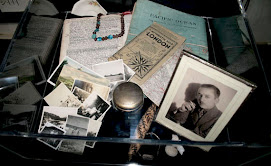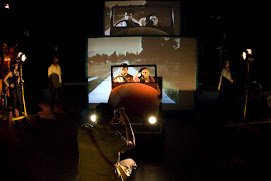A couple of weeks ago I was sorting through a lot of enigmatically-named Word files in an attempt to free up some more disk space, when I came across the following paragraph. It’s either a quote, or something I’ve paraphrased:
‘A workable specimen of the kind of thin-sliced play that our theatres currently find most feasible, is not so much a text as a pretext. A slim excuse brings together 2 people with conflicting views, and their confrontation gives a handy opportunity for supplying information, exploring issues, and ping-ponging badinage till they both part, changed to varying degrees by their encounter.’
Unfortunately I didn’t note the reference, so apologies to its author. Anyway, I clipped it out because its sentiments struck a chord, and got me thinking about ‘journalism for the stage’. You know the template: On the one hand there’s Character—or Group—A, passionately committed to one point of view, on the other, Character or Group Z shouting the opposite. But what happens to theatricality when you make the stage the domain of rational debate?
Is metaphor suspect in our age of flux and insecurity? Ditto poetic imaginings and wild flights of dramaturgical fancy? What’s behind this hunger for factual theatre? ‘What these plays offer audiences is an open door into a subject whose density might otherwise be difficult to negotiate’, writes UK theatre critic Lyn Gardner in Does Verbatim Theatre Still Talk the Talk? True, but aren’t there other—perhaps more theatrically adventurous—ways of dramatising the material for audiences? Look at what playwrights like Caryl Churchill, Mac Wellman or Martin Crimp do—they take a topic and recompose it into an accumulation of fragments, glimpses, about-turns, and fraught, emotional encounters.
As I’m writing this however, I’m starting to wonder if my concern here isn’t thinness, rather than theatricality … the ‘thin-sliced play’. After all, I’m a huge admirer of David Hare’s Via Dolorosa, and Lawrence Wright’s My Trip to Al-Qaeda—although both of these sophisticated pieces are what I’d term ‘performance essays’ rather than plays.
I remember an article in The Sydney Morning Herald almost a year ago (29 August 2006) about verbatim theatre. One of the interviewed writers identified his problem with the genre: that often the characters don’t change significantly during the course of the play. My response: Does this matter if the audience experiences a journey? Or in the case of a community initiative, if the participants’ involvement is transformative?
Verbatim or not to verbatim … ?
I’m no expert here. My own experiments with verbatim are partial, to say the least. In REDHEADS (2007) I created a 1950s background for a contemporary drama, via the presence of 2 historical figures, General MacArthur and R. G. Menzies, who spoke a collage of their own words, all taken from documents on the public record. While the final scene of MRS PETROV’S SHOE (2006), in which we hear the insights and comments of a parade of fictional witnesses, is written in mock verbatim style.
Tragic, or at least serious, events seem verbatim’s strong inclination. Be they a tribunal, a small-town murder, or the demise and rebirth of a sporting team. (Are there any verbatim theatre scripts that are primarily comic? Or does comedy writing require a manufacturing or refinement of material incompatible with the verbatim ethos?) And in common with most classical tragedy, we usually have a pretty good idea of how the story ends. We know for example, that King Lear’s decision to divide his kingdom will result in disaster. That the incestuous Giovanni and Annabella in ’Tis Pity She’s a Whore, will die. Our interest is in seeing how these narratives unfold, and what resonances Shakespeare’s or John Ford’s way of telling arouses in us.
The verbatim approach, together with its close relative, storytellers’ theatre, both spring from oral history and community arts. I wonder if some of the criticisms now circulating about verbatim are a consequence of taking these works out of context and putting them onto mainstages at $40+ a pop? The productions I’ve seen have been heartfelt, hardworking, and deftly staged. They have revealed the triumphs of theatre that aspires to documentary status—and its key dilemma.
Do recent events, recent history, digitally translated for endless replay, restrict the possibilities for theatrical intervention? Limit metaphorical strategies, comic innovation, or poetic reworking? Maybe. Or at least they present a different challenge. We know the facts, can pull up images, sound-bytes, court transcripts, first-hand accounts, with the click of a mouse. So the task then for playwrights is: What can we add to, or do with, the facts to make the theatrical experience bigger and more meaningful than a montage of news clips or a magazine article?
15 July 2007
Subscribe to:
Post Comments (Atom)
+Photo+Leah+McGirr+3.jpg)




No comments:
Post a Comment